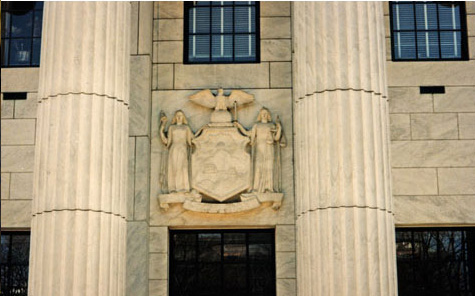The Court of Appeals, New York State
The New York Court of Appeals is located at 20 Eagle Street in Albany and is the highest court in the State of New York. The Court of Appeals is comprised of seven judges (a Chief Judge and six Associate Judges). Generally, appeals are taken from the New York Supreme Court, Appellate Divisions: The First, Second, Third, and Fourth Departments.
The New York Court of Appeals is one of the most influential Courts in the nation and has decided some of the most significant cases in American history. In 1846, the Court of Appeals was created by the New York State Constitution. At the time, the Court consisted of eight Judges and the panel has since reduced to seven. Each of the Judges on the seven-judge panel are appointed by the Governor and approved by the Senate.
Unlike appeals in the New York Supreme Court, Appellate Divisions, appeals are not necessarily “of right” in New York Court of Appeals. In most cases, one must ask for permission to appeal to the New York Court of Appeals. However, there are a few rare exceptions to this rule. Though no longer applicable in New York State, defendants sentenced to the death penalty in criminal cases have the right to appeal to the Court of Appeals. CPLR 5601 also provides that, where there is a double dissent in the Appellate Division on a question of law or where the Appellate Division makes a significant constitutional or statutory determination, an appeal to the Court of Appeals is as of right.
The New York Court of Appeals does not determine issues of fact. Types of issues that the Court of Appeals will hear are confined only to New York State Constitution questions of law. This means the Court of Appeals will not consider issues, such as whether evidence was sufficient to convict a defendant of a criminal offense. It is important to know what types of issues you may and may not include in your petition to the Court of Appeals.
When asking for permission, or “leave,” to appeal in a criminal case, one Judge is assigned to determine whether the New York Court of Appeals will grant leave to appeal. If the application is granted, the Court of Appeals will decide whether the petitioner will file only a brief with the Court or whether the Court will hear oral argument. Oral argument for the New York Court of Appeals takes place at 20 Eagle Street in Albany.
The Court of Appeals is known as a “hot bench.” This means that the judges are always very well prepared to hear each case and have read the attorneys’ briefs thoroughly and are intimately familiar with the record from the court below and the legal issues pertaining to each case. They will have lots of tough questions, so the attorneys must be well prepared at oral argument to answer all types of questions, including procedural, jurisdictional, substantive and constitutional law questions as well as hypothetical questions. Oral argument in the Court of Appeals is challenging to say the least; any attorney appearing before this Court must prepare in earnest weeks, often months, in advance. The objective at oral argument is not only to meet the challenging inquiry posed by a seven-judge panel, but also to successfully advocate for one’s client and to persuade the court of your client’s position.
The principal means of communicating/persuading the New York Court of Appeals judges is through the appellate brief. The brief is the primary legal document submitted to the Court of Appeals that thoroughly discusses the legal issues raised by the appellant (the individual appealing the case) and answered by the respondent (the individual answering the appellant’s brief). In the Court of Appeals the parties must submit multiple hard copies of the briefs, the record from the court below, as well as electronic copies of the brief. The Court of Appeals requires that the citations in the brief be hyper-linked to the source being cited, whether it is case law or statutory law. As previously stated the Court of Appeals is a “hot bench,” so the hard copy and electronic briefs must be prepared with great care and attention, keeping in mind that the objective of the appellate brief is not only to inform the judges on the law, but also to persuade them of your client’s position.
Writing appellate briefs to the Court of Appeals and appearing before this Court for oral argument is challenging, even for the most experienced of lawyers. Before embarking on an appeal, you should consider hiring an experienced appellate attorney.
